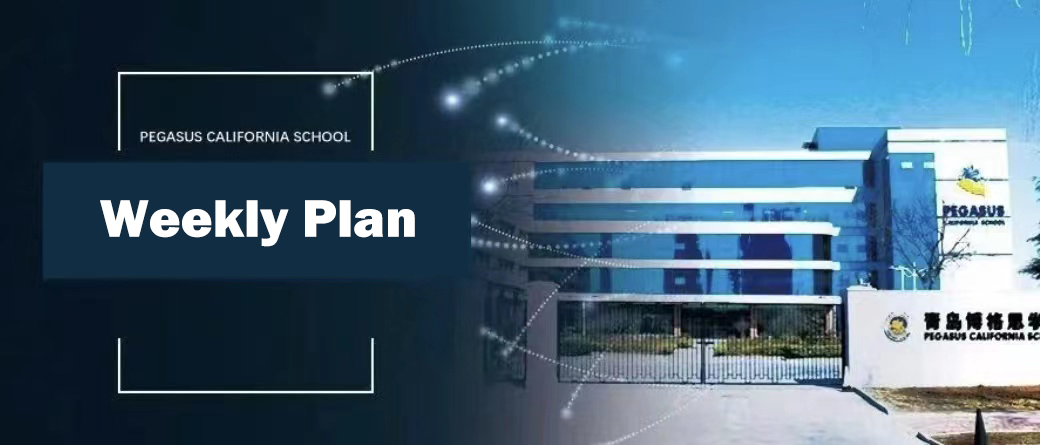Pegasus Week Plan (9.13-9.16)
Release Time:2022-11-11 09:02

Ayoub
(AP Calculus AB)
Determining limits using algebraic manipulation. Connecting multiple representations of limits.
(AP Statistics)
Describe the characteristics of quantitative distributions.
(AP Calculus BC)
Determining limits using algebraic manipulation. Connecting multiple representations of limits.
Joseph
(AP Economy)
Students will cover the following topics Radical and Rational Exponents, Complex Numbers, Linear equations and Absolute Values, and Quadratic Equations.
(AP Computer Science)
Introduction to Programming with Python. We will cover the essentials of the Python language: data types, conditionals, loops, basic data structures including lists, tuples and dictionaries, functions, object-oriented programming and inheritance.
(Engineering Product Science )
Student will use laser cutter to cut their acrylic LED light designed in inkscape, With the knowledge of inkscape students will design their own clock design. Students will then have the oppurtunity to design a project in groups which will be laser cutter.
(Physics)
Group Assignment covering Chapter 2 - Motion Along A Straight Line. Start of Chapter 3 - Vectors - Vectors and their components, Unit Vectors and adding vectors by components, Multiplying Vectors, Quiz.
(Algebra/Trigonometry)
More practice with factoring and completing the square; Learning complex numbers and roots; analyzing the quadratic formula.
(Geometry)
Introduction to lines and angles; Learning needed vocabulary (skew lines, transversals, corresponding angles and others); Solving for angles formed by parallel lines and transversals; Writing and solving for perpendicular angles/lines.
Matthew
(English 12)
To explain what happens in a text and explain the broader contexts that give meaning to the story. To develop an understanding of characterization and conflict, explaining its relevance through thematic analysis. Write thematic passage analyses of text using the “Analytical Notes” strategy.
(AP Language)
To complete a series of multiple choice (exam-style) questions focusing on exigence, purpose, and audience, identify rhetorical choices made that support the strategies used, and evaluate what makes effective or ineffective uses of rhetoric.
(Academy Reading & Writing)
Talk about different types of television programmes, practice speaking and using relevant topic based vocabulary, carry out questionnaires and explain information and know the functions of adverbs to be used in a definition paragraph describing a modern television.
Paul
(English 10)
Feedback from first writing assignment; Plagiarism; Academic Writing; Analyze short story ‘One Thousand Dollars’ by O. Henry for narrator POV, structure, conflict, character motive, character revelation, and theme; Writing exercises related to the story.
(AP English)
Feedback from first writing assignment; Plagiarism; Academic Writing; Analyze short story ‘A Rose For Emily’ by William Faulkner for narrator POV, structure, conflict, character motive, character revelation, and theme; Writing exercises related to the story.
(English 11)
Plagiarism; Academic Writing; Analyze the short story ‘Love Must Not Be Forgotten’ by Zhang Jie for narrator POV, structure, tension, conflict, character motive, character revelation, and theme; Writing exercises related to the story.
Johny
(Economy)
To understand economic decision-makers and markets. Households, firms, resource markets, and product markets.
(English 9)
To enable the students to better understand happiness and success and their effects on everyday life. Be able to express their opinions on the various subjects related to happiness and success.
(Academy English)
To get the students to be able to express themselves in english.Try to grow the students confidence and conversational skills by using gambits discussion.
Ilya
(AP European History)
Based on primary sources, develop a broad understanding of the context in which the Italian Renaissance and ideas of Humanism dominated the Italian Renaissance. Answer the question “What is humanism?” Begin to inquire into the Northern European Renaissance.
(PE)
Students are working on learning boxing basics, the foundation of archery, frisbee and basketball relevant skills.
(Digital Arts )
Students will learn how to work with negative and positive space. Students building awareness of what the elements of design and understands how to use them with variety and intention. Student uses analysis and intention to evaluate which thumbnails are their best three concepts to rough out.
(AP Studio Arts)
Guided work and sustained Investigation. Inquiry and Investigation Questions must be completed.
Phillip
(Orchestra/Band )
Prepare the music that we want to learn for the next part of the course.
(Jazz Band)
Introduce the subject of Blues music and understand the rhythmic intricacies of the style.
(Choir)
Introduce a new song and practice that song.
Sophie
(AP Chinese)
Students read the book <little princess > and write the Outline of this book; and Watch a debate program <Qipashuo> one topic.
Monica
(Academy Science)
Students be able to learn acceleration, free falling, circular motion, Centripetal Acceleration, and projectile Motion.
(Academy Math)
Finish chapter1 and have a test for Chapter1 to make sure students already learn according to the syllabus.
(Academy English Listening & Speaking)
Students be able to use the relatively correct grammar to describe their favorite celebrities: maybe a famous star or sportsman,etc.
Paul F.
(AP Biology)
Teachchapter 5: Ground Rules of Metabolism;functions of membrance & movement through membrance; Photosynthesis and reactions in chloroplast.
(AP Chemistry)
Reviewthe periodic trends; To explain photoelectron spectroscopy; Learn chemical bonds; Lewis Diagrams; resonance and formal charge.
(Biology)
A quickreview of last week's studies; chemicals of life.
(Chemistry)
Experimentof filtration; compound and periodic table.
Steve
(Psychology)
Students will be able to answer these questions:
1. Why are the answers that flow from the scientific approach more reliable than those based on intuition and common sense?
2. What are three main components of the scientific attitude?
3. How do theories advance psychological science?
4. How do psychologists observe and describe behavior?
5. Can laboratory experiments illuminate everyday life?
6. Why do psychologists study animals, and is it ethical to experiment on animals?
7. Is it ethical to experiment on people?
8. Is psychology free of value judgments?
Previous Record:Pegasus Week Plan (9.5-9.9) Next Record:Pegasus Week Plan (9.19-9.23)
